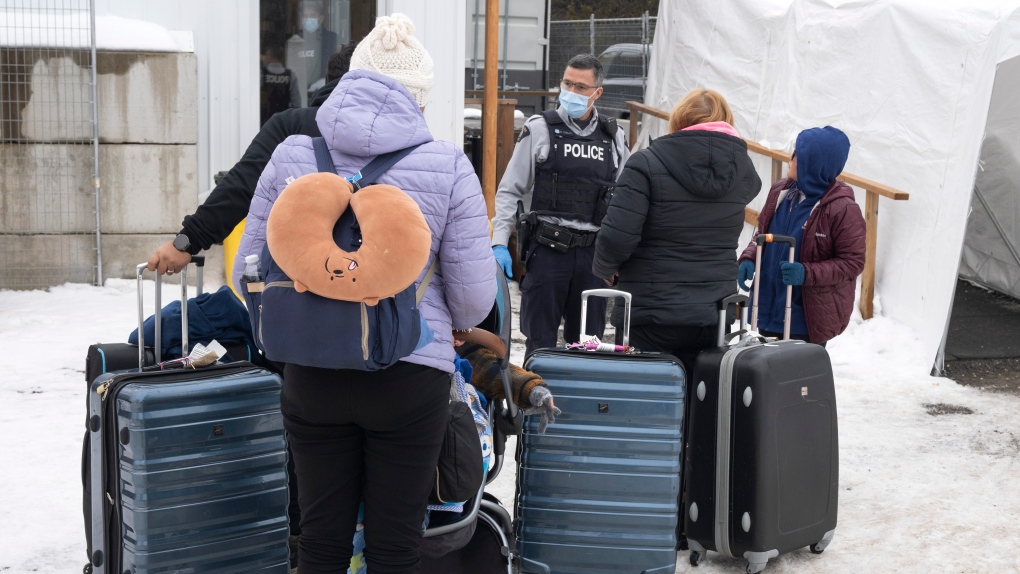
As the number of asylum claimants in Canada grows, the federal government says it’s taking a national approach to ensure too much pressure isn’t placed on any one region.
The number of asylum seekers entering Quebec has placed pressure on publicly funded services and accommodation in that province, which has prompted transfers to other parts of Canada since the end of June.
Numbers provided by Immigration, Refugees and Citizenship Canada (IRCC) show as of Feb. 26, 7,131 asylum seekers who initially made the irregular crossing, between official ports of entry, into Canada from Roxham Road in Quebec have been transferred to Ontario.
Most so far are going to Niagara Falls, Ont. As of Feb. 16, 2,841 claimants had arrived in the city, and 10 days later that number increased to 4,313.
Niagara Falls Mayor Jim Diodati has been calling on Ottawa for him to be included in plans moving forward, and have a seat at the table to come up with solutions.
Diodati said social services are stretched and wants millions of dollars to deal with the influx of people staying in the community. As it’s a federal issue, he said the services should not be paid with local property tax dollars.
“The folks here in town are going to schools, they are being bussed directly from 11 hotels to the schools, and the schools are having to set up emergency classrooms in libraries and gymnasiums are bringing in extra teachers,” Diodati said last week.
As tourist season approaches, he’s concerned about the city recovering economically from the pandemic.
“If we don’t have the hotel stock or the available inventory, because it’s a supply and demand thing, prices will be higher, there will be less rooms. And our concern is [it] may impact our recovery,” Diodati said.
“IRCC has worked with provincial and municipal partners in Niagara Falls in setting up our hotel operations to ensure that they were prepared for the arrival of asylum seekers,” said an IRCC spokesperson in response to questions sent by CTV News Toronto to Immigration Minister Sean Fraser’s office.
“We have been meeting with stakeholders on a bi-weekly basis to provide operational and logistical updates and to address any concerns that they may have.”
The statement also said an interim housing assistance program was set up to provide financial support, on a cost-shared basis, to provinces and municipalities related to the provision of temporary housing for asylum claimants. It said it has been working to support provinces and municipalities by “directly funding the temporary accommodation to those who have no other options.”
The IRCC said it will continue discussions with municipal partners in Niagara Falls to ensure they are well-supported and will provide updates as the situation evolves.
‘I AM TOTALLY GRATEFUL’
CTV News Toronto spoke with a 42-year-old man from Colombia who was bussed to Niagara Falls in July and has been staying in one of the hotels.
After living in the United States for six months, he said he crossed the border at Roxham Road to find better opportunities and hopes eventually to settle in Nova Scotia.
Together we spoke with three other much younger men from Colombia and Venezuela who also crossed on foot.
One of the men explained many who come to Canada through Roxham Road are escaping poverty and violence. They said their hotel rooms are shared with family members, and meals are covered.
“What I can tell you is that the treatment here has been very excellent for us and I am totally grateful,” one man said through a translation app.
“The world is facing unprecedented flows of migrants and refugees. The Government of Canada encourages asylum claimants to enter Canada at designated ports of entry. However, asylum claimants are a vulnerable group, and Canada has obligations under the Refugee Convention that do not apply to other areas of immigration,” the IRCC said.
“The majority of asylum claimants who arrive between ports of entry, arrive at Roxham Road, in Quebec. This has placed pressure on publicly funded services and accommodation in Quebec.”
As of June 30, 2022, the government said it began transferring claimants from Quebec to Ontario to help reduce the pressures from the number of individuals who claimed asylum between ports of entry.
Transfers to Atlantic provinces, including Nova Scotia and New Brunswick began on Feb. 19.